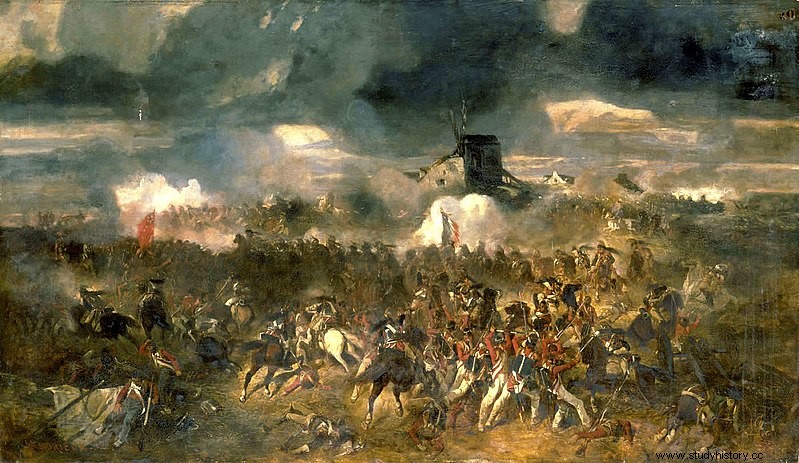- Napoleon returned from the island of Elba on March 20, 1815 and, after restoring his power in Paris, he set about reconquering the Empire:this was the Hundred Days period. However, not all of France is won over to his cause, and the kingdoms of Europe united for the seventh time at the Congress of Vienna.
- In June 1815, despite a great advance in Belgium, Napoleon's army, slowed down by bad weather, allowed the 70,000 allies led by the English general Wellington to settle near the village of Waterloo. The Napoleonic army, made up of so many men, came up against fierce resistance.
June 18, 1815

Characters
Napoleon Bonaparte
Emmanuel de Grouchy
Arthur Wellesley aka Duke of Wellington
Gebhard Leberecht Blücher
Procedure
The imperial army was late, and the first cannon sounded at 11:30 a.m. against the Hougoumont farm, transformed into a real stronghold. She is expecting reinforcements from Grouchy during the day.
In the afternoon the fight is general. In the center, under the fire of the artillery, the imperial army was pushed back after numerous assaults and was unable to break through the three English strongholds.
At the end of the afternoon, the Prussian army of General Blücher arrives as reinforcements of the allies, on the right flank. The battle is violent, each side takes and loses the advantage, but at the beginning of the evening, the advantage turns to the allies who push back the imperial army little by little. Napoleon feared being surrounded.
The Imperial Guard launched a final assault as the rest of the army retreated towards Paris, the Prussians on their heels:Grouchy's reinforcements never arrived.
Consequences
- Back in Paris, Napoleon abdicated a second time on June 22, 1815, putting an end to the First Empire and the Hundred Days for good. He was exiled to Saint Helena.
- Coalition troops arrive in Paris on July 6 and return Louis XVIII to power on July 8:this is the second Restoration.
- With more than 11,000 French dead and 30,000 wounded in just four days, the Belgian campaign was one of the deadliest of the Revolution.
